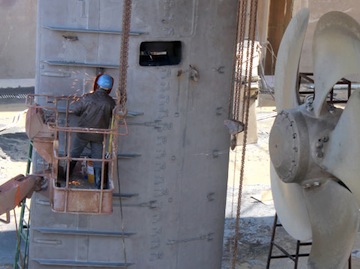The following is the text of a news release from the Carbon War Room (CWR):
(LONDON) — The Carbon War Room has announced that a collaboration between Hammonia Reederei, a Hamburg-based shipowner, and New Orleans-based charterer Intermarine has enabled the retrofit of three sister vessels with multiple efficiency technologies. Under anticipated operating conditions, each vessel is expected to see 25 percent fuel savings, to be shared between Hammonia and Intermarine.
CWR awarded Hammonia a $120,000 grant to retrofit the vessels Industrial Ruby, Industrial Royal and Industrial Revolution. The project won praise for its ambitious use of multiple technologies, as well as for its revenue-sharing collaboration between charterers and owners. Intermarine has agreed to award Hammonia a rate that is above market rates through a retrofit clause in the charter party. This effectively shares the fuel savings between both parties, while also earning Hammonia a five-year time charter.
Furthermore, as Industrial Ruby is Liberian-flagged, this vessel is eligible for a 50 percent tonnage tax discount for the first year after retrofit. This is part of the incentive scheme offered by the Liberian Registry to encourage and reward efficiency retrofits using third-party finance.
The retrofit bundle installation includes an optimized bulbous bow, rudder optimization, high-performance hull coating, and trim and ballast optimization at standard dry dock. The 10,536-dwt Industrial Ruby is the final vessel to leave dry dock after undergoing the retrofit and was relaunched on March 1.
Hammonia purchased Industrial Ruby as well as sister vessels Industrial Royal and Industrial Revolution secondhand. The vessels’ financier has extended the liens to finance the bulk of the $1.2 million retrofits.
Galen Hon, shipping operations manager for the Carbon War Room, said, "This deal showcases how to overcome the split incentive between owners and charterers, and delivers hard proof of the fuel savings from deep retrofits. Hammonia and Intermarine should be congratulated for employing best practices to measure and monitor savings, and for sharing their data — which will increase industry confidence in the profitability of retrofits. These first movers will inspire more owners and charterers to follow in their footsteps.”
The CWR grant funded the installation of continuous monitoring software on Industrial Ruby, Industrial Royal and Industrial Revolution in order to measure, verify, and publicize the fuel and carbon savings. The data will be analyzed by the independent third-party University College London (UCL) over a five-year period, with initial results being released to the industry six months post-dry dock.
According to DNV GL, only one in 10 companies aims for greater than 10 percent savings from its retrofit projects. After two years of working on retrofit finance, CWR views this deal as a model for the industry to achieve far greater savings, while creating win-win scenarios for both charterers and owners. This is especially pertinent in today’s market of overcapacity. CWR’s team can work with and support any interested owners or charterers to help them develop or find financing for efficiency retrofit projects.
This project is funded by the Dutch Postcode Lottery, which recently granted $1.09 million to CWR and Rocky Mountain Institute (RMI) for their LeaderShip project, expanding their efforts in the shipping industry, including collaboration with the Port of Rotterdam.
“The Dutch Postcode Lottery is thrilled that our commitment to a green and sustainable future is being realized by way of this collaboration, thanks to Carbon War Room and Rocky Mountain Institute. More efficient ships give environmental benefits for port communities around the world,” said Margrietz Schreuders, head of charities, Dutch Postcode Lottery.
Owners, operators, and charterers interested in discussing retrofit financing should contact James Mitchell at jmitchell@carbonwarroom.com.

